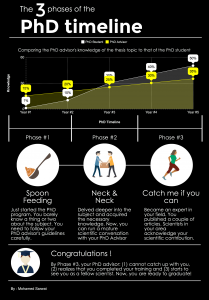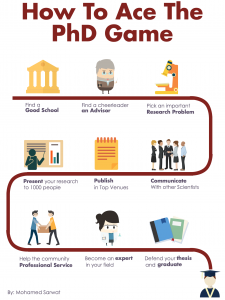
I created this infographic (on the left) for those who think about pursuing a PhD. It is supposed to be simple and to the point (WikiHow style). The infographic targets folks who are not familiar with the PhD process. Hence, some of these steps may seem straightforward to professors and well-established scientists.
As a graduate student, there are three phases you go through the course of your PhD studies. The first phase is called the “Spoon Feeding” phase. In this phase, you just started the PhD program. You barely know a thing or two about the subject. You advisor know much more about your thesis topic than you actually do. You need to follow your PhD advisor’s guidelines carefully. The second phase is named the “Neck & Neck” phase. In such phase, you delved deeper into the subject and acquired the necessary knowledge. Now, you can run a mature scientific conversation with your PhD Advisor. The third phase is called the “Catch me if you can” phase. In this phase, you became an expert in your field. You published a couple of articles in good venues. Scientists in your area starts to acknowledge your scientific contribution. By the third phase, your PhD advisor: (1) cannot catch up with you, (2) realizes that you completed your training and (3) starts to see you as a fellow scientist. Now, you are ready to graduate!
In this infographic, I share my perspective on the PhD timeline. Below is other scholar’s critique of the infographic:
” I am skeptical about the “ready to graduate” part at the end. PhD means “Doctor of Philosophy in X”, where X is a scientific field. Your infographic accurately depicts the X part, but ignores the “Philosophy” part. To graduate a student, the advisor is responsible on ensuring that the student not only has enough knowledge in X, but also has excellent “philosophy”. This includes the ability to decide on which research problems to tackle, to judge on what is good and bad in research, and to have the appropriate big picture understanding of how X fits in the world knowledge. Not to mention excelling in soft skills like how to write a paper, how to position your research, and communication/presentation skills.” — Mohamed F. Mokbel


